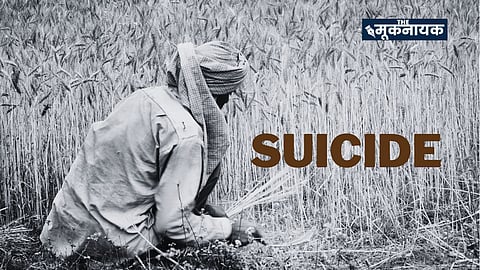
Alappuzha - On November 11th, a 55-year-old Dalit farmer from Thakazhi in Alappuzha district, Kerala, tragically took his own life by consuming poison. The deceased, KG Prasad, who served as the district president of the RSS-affiliated Bharatiya Kisan Sangh, attributed his desperate act to the refusal of loans by banks and held the state government responsible for plunging him into a severe financial crisis.
According to the suicide note left by the farmer, KG Prasad borrowed from the State Bank of India in 2011, successfully repaying Rs 20,000 and settling the loan in 2020 through a one-time payment option offered by the bank. Subsequently, his attempts to secure loans from other banks were thwarted by a low CIBIL score, a metric reflecting an individual's creditworthiness. The note indicated that, in addition to the default on the SBI loan, the CIBIL score was adversely affected by a Paddy Receipt Sheets (PRS) loan in Prasad's name.
In Kerala, banks extend need-based short-term post-harvest credit to registered paddy growers, whose harvest has been procured by the Kerala State Civil Supplies Corporation Limited (Supplyco). The suicide note clarified that the PRS loan represented the cost of the paddy he had procured. According to Prasad's account, the state government bore the responsibility of repaying the PRS loan along with interest.
A considerable gathering of farmers and BJP activists organized a demonstration on the Ambalappuzha-Tiruvalla road at Thakazhi on Saturday afternoon while transporting Prasad's body. In the evening, Prasad's remains were cremated on the premises of his residence.
Over 100 BJP activists were present at the site. The ambulance carrying the body of the deceased farmer was used to block the traffic of the road.
Farmers, upon the state government agency Supplyco's procurement of paddy, receive credit in the form of PRS loans based on the Paddy Receipt Sheet. These loans, facilitated by banks after the paddy procurement, come with the understanding that the state government will take on the responsibility of repaying them at a later date.
After Supplyco procures paddy, farmers are issued a Paddy Receipt Sheet (PRS), serving as collateral for them to secure bank loans equivalent to the value of the paddy they have supplied. The customary practice involves the state government later repaying the bank, settling the loan on behalf of the farmers.
In the specific case of KG Prasad, he expressed frustration in a suspected suicide note, claiming that banks were denying him loans solely due to his existing PRS loan. According to Prasad, he had availed the PRS loan to cover the costs associated with supplying paddy to the government. He argued that it was the government's responsibility to repay the PRS loan, including the accrued interest. Tragically, Prasad attributed his death to what he perceived as the government's failure to fulfil this crucial responsibility. This unfortunate incident underscores the intricate interplay between agricultural credit systems, bureaucratic processes, and the profound impact on the lives of farmers.
KG Prasad came from a financially weak background, something which is not rare among dalit farmers. He was in a financial predicament and facing challenges in carrying out the harvest this season due to the denial of loans by banks.
According to the research paper titled ‘Cultivating distress: cotton, caste and farmer suicides in India’ published in 2021, between 1995 and 2018, close to 400,000 farmers took their own lives in India, averaging around 48 suicides daily. The majority of these suicides involved individuals from 'backward' castes, with a notable representation of Dalit farmers. Existing literature consistently indicates that small and marginal farmers, predominantly from 'backward' castes, bear a disproportionate burden of these tragic incidents.
Humiliation is a part of the reason that primarily drives such actions. KG Prasad felt the same emotion when he was denied loans on multiple occasions even after government schemes were supposed to help him out. According to the same research, “lived experiences in the context of local socio-cultural settings shape the experience of humiliation in the documented case studies. Humiliation is a common theme that cuts across all the case studies as an important affect leading to Dalit farmer suicides.”
Humiliation is used as a tool for the oppressors in this nation. The various cases of upper-caste men urinating on lower-caste individuals have been making the news lately. In 2021, in Viramgam near Ahmedabad, Gujarat, approximately 700 kilometers away, a cemetery utilized by Dalits was recently inundated with sewage water. In 2023, faeces-infected drinking water made its way to the Dalit community in Tamil Nadu.
In 2020, a total of 10,677 individuals involved in the agriculture sector took their own lives, marking a 3.85% increase from the figures recorded in 2019. Among them, 5,579 were farmers, individuals engaged in farming either on their own land or leased land. This represented a decrease of 6.69% compared to the previous year.
Within the broader category of the agriculture sector, there were also agriculture laborers, and unfortunately, 5,098 of them committed suicide in 2020. This figure showed a significant rise of almost 18% compared to the numbers reported in 2019. The increase in suicides by agricultural laborers was particularly pronounced in states like Kerala, Karnataka, and Madhya Pradesh, where the numbers surged significantly in 2020.
You can also join our WhatsApp group to get premium and selected news of The Mooknayak on WhatsApp. Click here to join the WhatsApp group.